STORES THAT HAVE proved their staying power through a century or more have probably seen it all — natural disasters, world wars, economic booms, bubbles and busts. They’ve had their resolve tested, sometimes by fire and flood.
In 1977, for example, a flood hit the Kansas City, MO, area that caused over $100 million in damage and completely submerged Tivol’s vault in the basement. A scuba-certified employee dove down and swam through the basement to retrieve the waterlogged jewelry.
Shreve & Co.’s San Francisco flagship opened just one month before the earthquake of April 18, 1906 turned much of the city to rubble. The store reopened three years later.
Perseverance played a big part in Hamilton Jewelers history, too, since two locations had to be rebuilt after fires in 1948 and 1957.
Century-old stores do have bragging rights and remarkable stories to tell.
On the other hand, says Bruce Freshley, president of Freshley Media, as impressive as it is to stay in business for decades, age in itself is not a compelling reason for people to do business with a company. It shouldn’t be your unique selling proposition.
“Age is not an advertising message,” he says. “How we got old is. If you’ve been around 100 years, most people know that. That’s a given. The message has got to be how good you are.”
John Henne, owner of Henne Jewelers in Pittsburgh, PA, agrees.
Advertisement
“We used to advertise ‘Jewelers since 1887.’ Now we use the line ‘Jewelers for Life,’” he says. “We do not shy away from letting people know our age and our history, but it is not the focus of our advertising because I don’t think it is that important to most people. It is a nice added bonus but not the deciding factor.”
When you devise a marketing message, explain your success (don’t brag about it) and leverage your history to build trust for future business.
Stores with a history must recognize and celebrate what they’ve done right while continuing to innovate. “I don’t care how old they are — five years or a hundred years — they have to start every year by saying, ‘If I were going to start my business today, what would it look like?’” Freshley says.
Stores that last are stores that have the right brands, the best employees, a sterling reputation and strong advertising.
Hamilton’s president, Hank Siegel, says consistency that evolves with the times allows Hamilton Jewelers to stay relevant. “The market has, of course, changed dramatically over the last century. Most important is to have clarity as to who you are. We don’t jump on every trend full-in, but try to stick with timeless and classic or modern classic design, with a smattering of trend and new fashion.
Stores with a future also stay relevant by:
- Building their bridal business, and marketing effectively to the important 24-to-35-year-old core bridal market.
- Attracting bright young talent to join more experienced staff. Young people want to be working in a store where their 20- and 30-something friends want to shop.
- Engaging and empowering the next generation. Encourage them to get experience outside of the business and bring them in only if there is a job they are qualified to perform, says Lauren Owen, principal of Redpoint Succession and Leadership Coaching.
- Having owners who know how to transition and when to call it quits — or risk frustrating and alienating their successors.
The resilient retailers profiled on the following pages are just a small sample of the century-plus club in the jewelry industry, yet they offer valuable lessons for store owners considering how to make their businesses last.
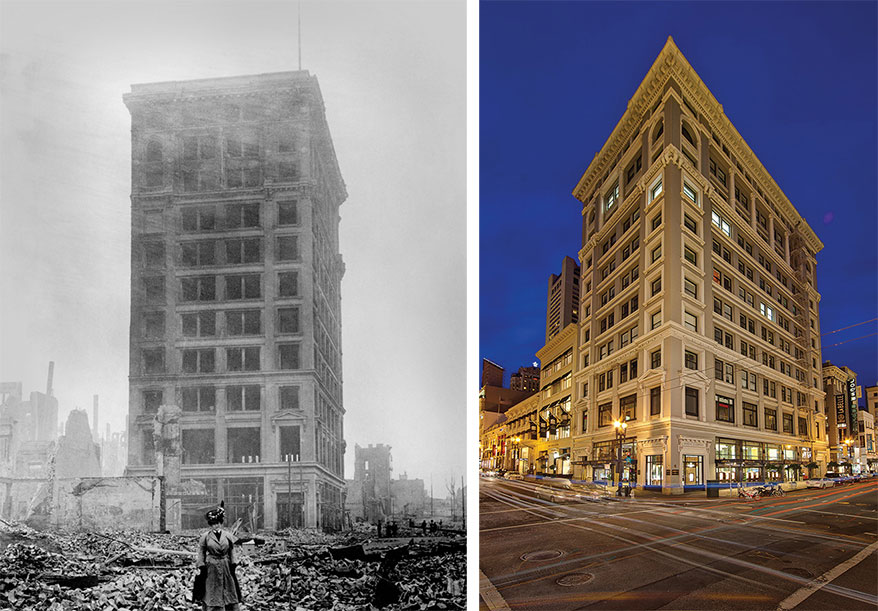
(Left) San Francisco’s Shreve Building in April 1906 after the earthquake and fire, which struck just one month after the store opened. (Right) the exterior of the store today.
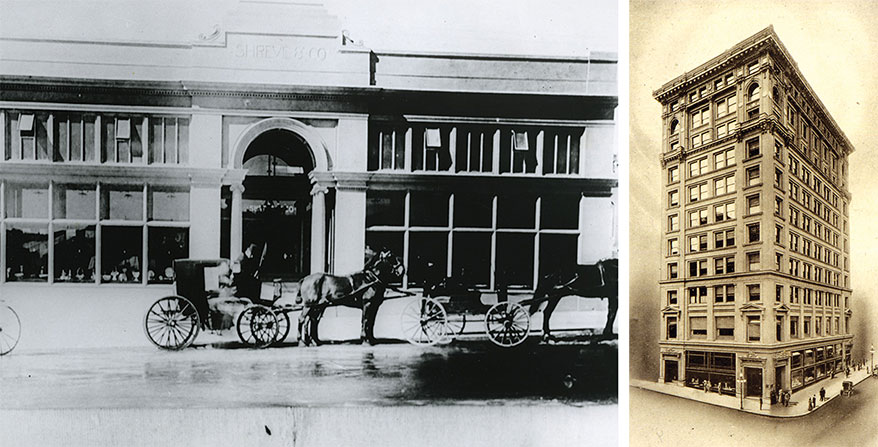
Left, an even earlier location. Right, the Shreve Building in March 1906
Be Open to Change
Shreve & Co. Jewelers, San Francisco

Shreve & Co. was founded just four years after gold was discovered in California, making it the oldest retail business in San Francisco. Evolving customer service is one key to its continued success. In the 1890s, for example, most customers paid for their purchases with heavy sacks of $20 gold pieces. So a staff of young men carried the sacks to the cashier and made the payment, got the purchases wrapped and delivered the packages and change to the customer, who was waiting in a lounge. “Today we issue iPads to each associate to provide instant access to our vendors’ catalogs, allowing clients to visualize a special piece with the same state-of-the art technology they use in their daily lives,” general manager Glen Ross says.
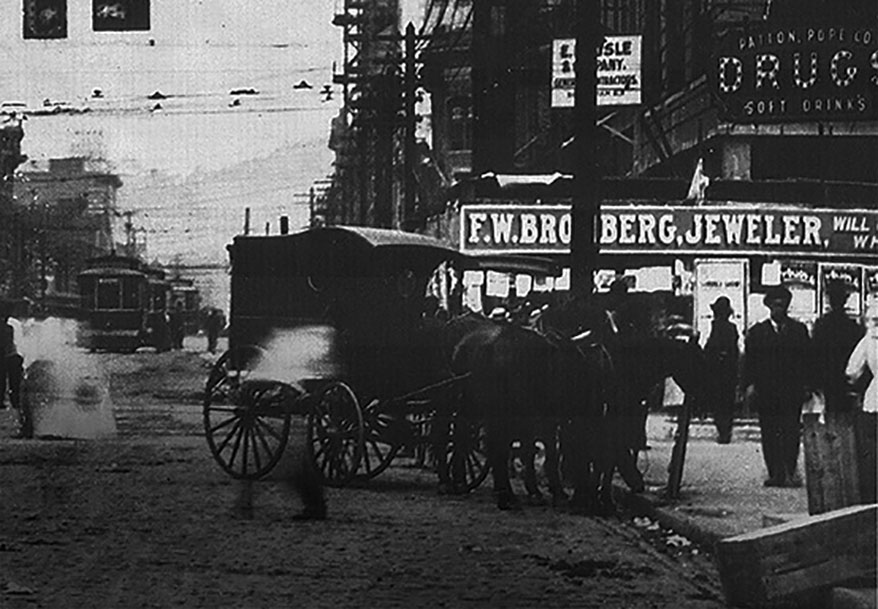
Bromberg’s circa 1910
With Luck, Adapt
Bromberg’s, Birmingham, AL
 According to a study commissioned by Family Business magazine, Bromberg’s has the honor of being the oldest family-owned retail business of any kind in the U.S. “We’re one year older than Tiffany,” says sixth-generation president Ricky Bromberg. “Our family joke is that the founder told Mr. Tiffany, ‘Hey, you should try this.’” He says adaptability played a role in the company’s long life span (they’ve sold furniture and had one of the South’s first Kodak franchises), but adds: “One degree is luck. There was a next generation willing and able to go into the business, and they were male. Although that doesn’t matter now, 100 years ago it did.”
According to a study commissioned by Family Business magazine, Bromberg’s has the honor of being the oldest family-owned retail business of any kind in the U.S. “We’re one year older than Tiffany,” says sixth-generation president Ricky Bromberg. “Our family joke is that the founder told Mr. Tiffany, ‘Hey, you should try this.’” He says adaptability played a role in the company’s long life span (they’ve sold furniture and had one of the South’s first Kodak franchises), but adds: “One degree is luck. There was a next generation willing and able to go into the business, and they were male. Although that doesn’t matter now, 100 years ago it did.”
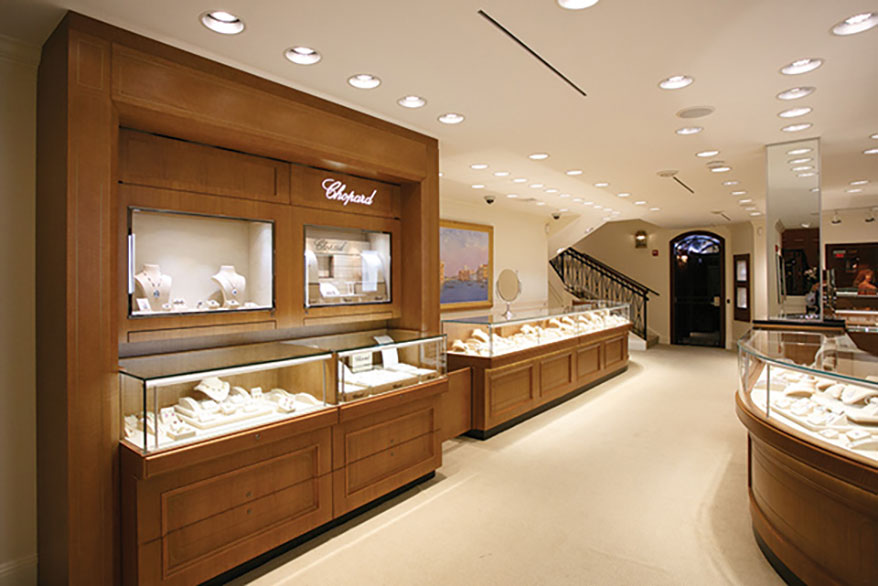
Shreve, Crump and Low today
Be True to Your Roots
Shreve, Crump and Low, Boston, MA
 Shreve, Crump and Low has deep roots not only in New England but also in the capitalist origins of the country, explains marketing director Brian Walker. In the past 100 years, the flagship store has moved only once, briefly, and not far. Back where it belongs now, it’s graced by an 1840 grandfather clock inscribed with the store’s name, and a chandelier made by Lalique in 1929. That chandelier was lost for 10 years but rediscovered in 100 pieces in a local barn and reassembled — against all odds — by an adept electrician. “In general, we avoid trendy kinds of things,” Walker says. “We value fine gifts, whether it’s a beautiful pair of diamond studs, a fine watch, or a piece of Baccarat crystal. We specialize in things that are timeless, that will outlast you and your grandchildren. There will always be a market for classic, traditional style.”
Shreve, Crump and Low has deep roots not only in New England but also in the capitalist origins of the country, explains marketing director Brian Walker. In the past 100 years, the flagship store has moved only once, briefly, and not far. Back where it belongs now, it’s graced by an 1840 grandfather clock inscribed with the store’s name, and a chandelier made by Lalique in 1929. That chandelier was lost for 10 years but rediscovered in 100 pieces in a local barn and reassembled — against all odds — by an adept electrician. “In general, we avoid trendy kinds of things,” Walker says. “We value fine gifts, whether it’s a beautiful pair of diamond studs, a fine watch, or a piece of Baccarat crystal. We specialize in things that are timeless, that will outlast you and your grandchildren. There will always be a market for classic, traditional style.”

Borsheims after a 2006 expansion
Offer Variety
Borsheims, Omaha, NE
 In 1948, the Friedman family purchased the business that was founded by Louis Borsheim in 1870. “Our success has been the result of the business model the Friedman family created when they purchased Borsheims,” says marketing director Adrienne Fay. “The philosophy of having a great selection of inventory, at a great price, with expert sales associates has guided us to continued longevity. It’s the same business model that we use today.” In 1989 Warren Buffett purchased a majority of Borsheims’ stock. The store is now one of America’s largest. Its 62,500 square feet contain more than 100,000 pieces of inventory.
In 1948, the Friedman family purchased the business that was founded by Louis Borsheim in 1870. “Our success has been the result of the business model the Friedman family created when they purchased Borsheims,” says marketing director Adrienne Fay. “The philosophy of having a great selection of inventory, at a great price, with expert sales associates has guided us to continued longevity. It’s the same business model that we use today.” In 1989 Warren Buffett purchased a majority of Borsheims’ stock. The store is now one of America’s largest. Its 62,500 square feet contain more than 100,000 pieces of inventory.
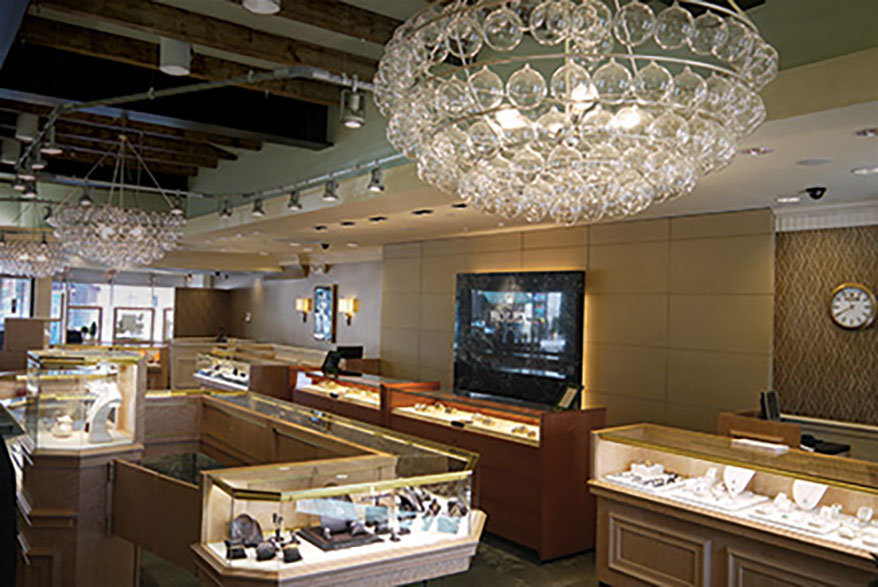
Springer’s 2012 remodel
Stay Relevant
Springer’s Jewelers, ME and NH
 Fifteen years ago, owner Richard Beaulieu realized he had to win a new generation of buyers by focusing his marketing on 25-to-34-year-old diamond-engagement ring consumers, so he rebuilt his bridal department, strengthened his relationships with traditional brands and added new designers. In 2012, Beaulieu reopened his completely remodeled flagship store in downtown Portland and this old legend is now arguably the newest and coolest store in town.
Fifteen years ago, owner Richard Beaulieu realized he had to win a new generation of buyers by focusing his marketing on 25-to-34-year-old diamond-engagement ring consumers, so he rebuilt his bridal department, strengthened his relationships with traditional brands and added new designers. In 2012, Beaulieu reopened his completely remodeled flagship store in downtown Portland and this old legend is now arguably the newest and coolest store in town.
Advertisement
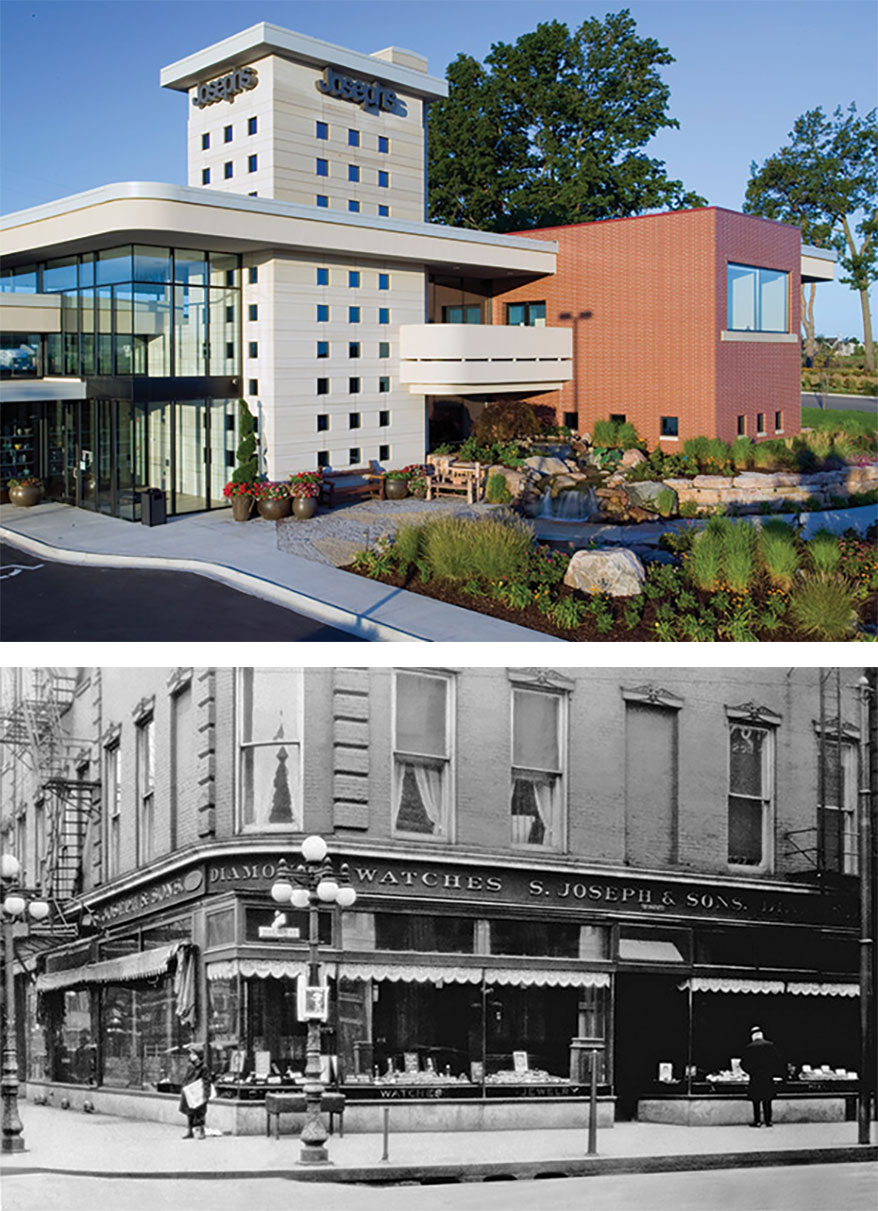
Top, Josephs opened its Frank Lloyd Wright-inspired building in 2005. Above, a turn of the 20th century view of Josephs.
Show Up!
Josephs, Des Moines, IA
 More than anything else, John Joseph says, consistent community involvement is why his family’s business has been around so long. “My name’s out there, we’re out there. We’re very involved in charities, breakfast clubs, boards.” Building relationships with other businesspeople has been crucial, particularly as Des Moines has grown. A commitment to quality product makes a difference, too. “The other thing is, we’re in the store all the time,” Joseph says of himself and brother Toby. “We don’t take six weeks’ vacation; we don’t leave at 2 to play golf. Your stores tend to run better when you’re there.”
More than anything else, John Joseph says, consistent community involvement is why his family’s business has been around so long. “My name’s out there, we’re out there. We’re very involved in charities, breakfast clubs, boards.” Building relationships with other businesspeople has been crucial, particularly as Des Moines has grown. A commitment to quality product makes a difference, too. “The other thing is, we’re in the store all the time,” Joseph says of himself and brother Toby. “We don’t take six weeks’ vacation; we don’t leave at 2 to play golf. Your stores tend to run better when you’re there.”
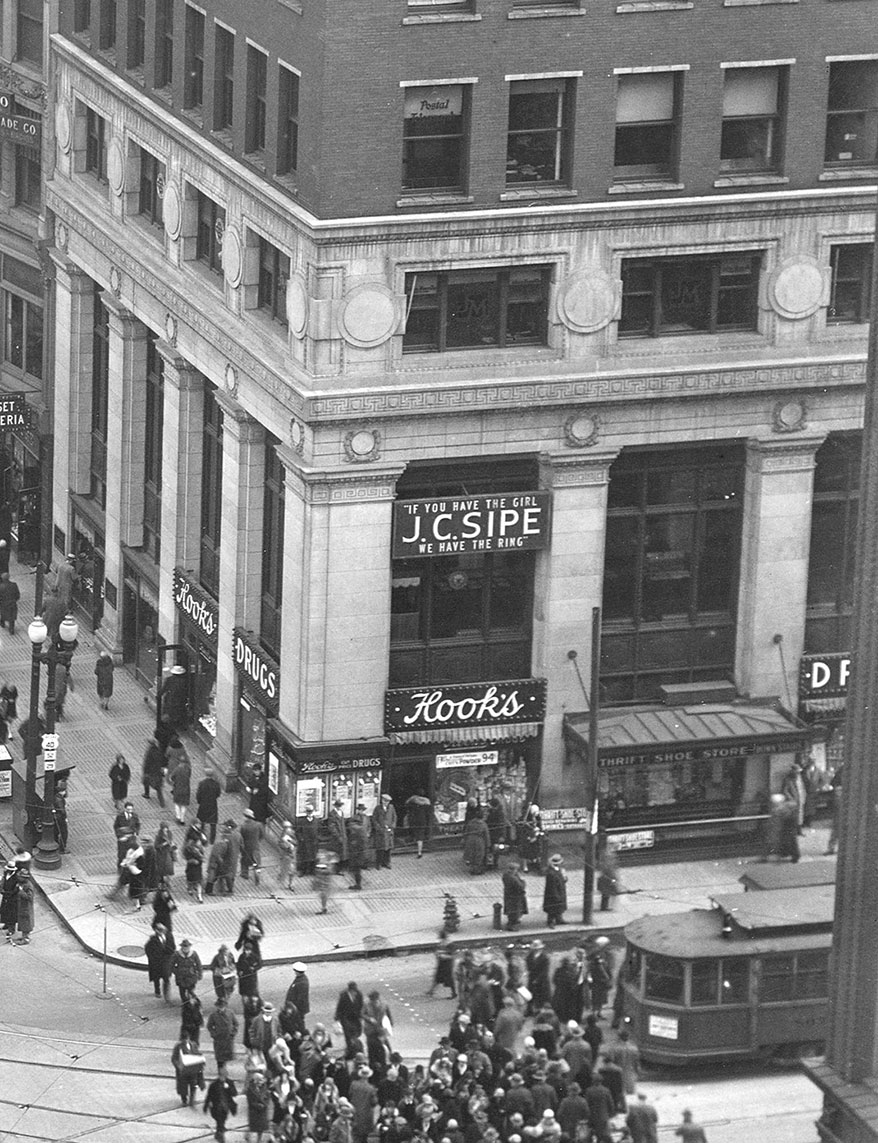
J.C. Sipe circa in 1909
Trust Word of Mouth
J.C. Sipe Jewelers, Indianapolis, IN
 Sam Sipe credits inertia with his company’s success, only partly facetiously. “It may be years between visits, but people remember to come back and visit us when the time is right.” He moved from the mall to a freestanding location in 2002 and hasn’t looked back. “We’ve always had a destination-oriented business,” he says. For 63 years, they were on the fifth floor of a bank building. “We survived because people sent people.”
Sam Sipe credits inertia with his company’s success, only partly facetiously. “It may be years between visits, but people remember to come back and visit us when the time is right.” He moved from the mall to a freestanding location in 2002 and hasn’t looked back. “We’ve always had a destination-oriented business,” he says. For 63 years, they were on the fifth floor of a bank building. “We survived because people sent people.”
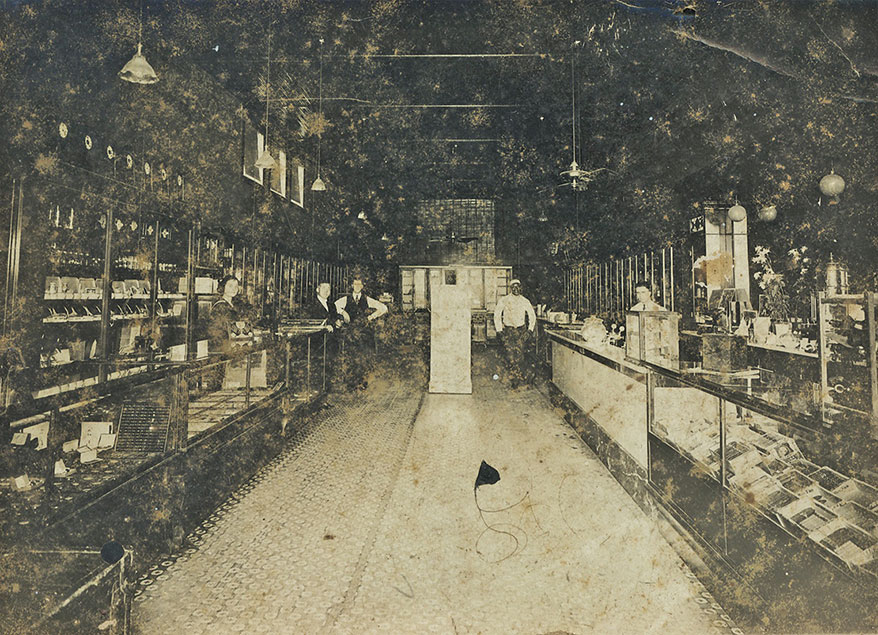
An undated photo of Sam L. Majors Jewelers.
Value Education
Sam L. Majors Jewelers, Midland and Austin, TX
 “What originally brought my great-great grandfather out to West Texas from Alabama is that he was a railroad watch inspector and when he settled in his new home he thought getting into jewelry was the right thing for him to do,” says Marc Majors. “I’m glad he did.” The business stays strong due to an educated staff, most of whom have GIA and AGS training and certification. “Also just treating people right, giving great customer service and having the best products sets us apart and helps keep us going. You have to have a passion for this industry, and with things changing all of the time you have to be willing and able to adapt while keeping your age-old traditions and practices in place.”
“What originally brought my great-great grandfather out to West Texas from Alabama is that he was a railroad watch inspector and when he settled in his new home he thought getting into jewelry was the right thing for him to do,” says Marc Majors. “I’m glad he did.” The business stays strong due to an educated staff, most of whom have GIA and AGS training and certification. “Also just treating people right, giving great customer service and having the best products sets us apart and helps keep us going. You have to have a passion for this industry, and with things changing all of the time you have to be willing and able to adapt while keeping your age-old traditions and practices in place.”
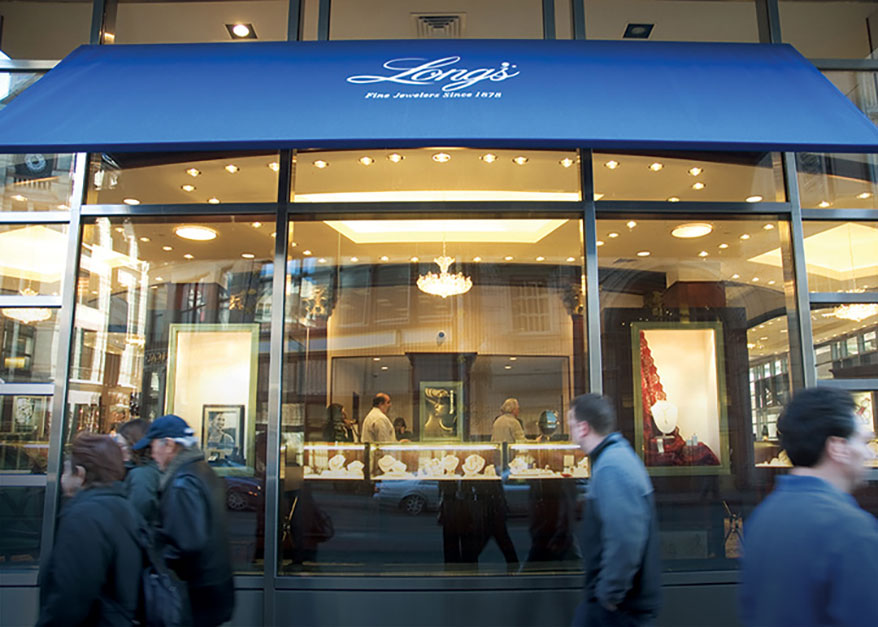
Long’s: A balance between past and present
Find Balance
Long’s Jewelers, MA
 “It took generations to get to this point,” says Long’s president Craig Rottenberg. “I’m the caretaker of a 130-year-old name. I jokingly say it’s my job not to screw it up.” But he’s serious, too. “We tell all our employees that everyone is an ambassador for the brand, and everyone has an opportunity to either improve the name or hurt it.” Strategically, Long’s has worked to stay current by incorporating tech like iPads into the business and by hiring a variety of ages and personality types. “We always have a balance. The last thing I want is someone to walk in and find employees who only know certain things.”
“It took generations to get to this point,” says Long’s president Craig Rottenberg. “I’m the caretaker of a 130-year-old name. I jokingly say it’s my job not to screw it up.” But he’s serious, too. “We tell all our employees that everyone is an ambassador for the brand, and everyone has an opportunity to either improve the name or hurt it.” Strategically, Long’s has worked to stay current by incorporating tech like iPads into the business and by hiring a variety of ages and personality types. “We always have a balance. The last thing I want is someone to walk in and find employees who only know certain things.”
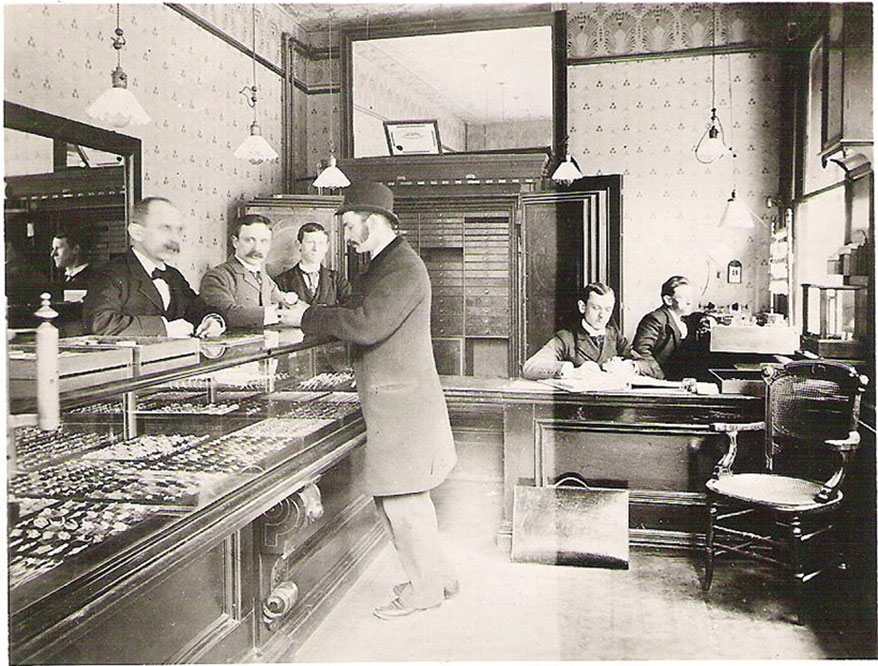
William Barthman has been a New York Financial District fixture since 1884
Weather the Storms
William Barthman, New York, NY
 “We’ve been very fortunate that our name has been able to stand the test of time,” says general manager Richard Granatoor of his store in Manhattan’s financial district. (A Brooklyn outpost opened in 1998.) The store, perhaps best known for its landmark clock embedded in the sidewalk outside, has weathered its share of storms, not least the Sept. 11, 2001, terrorist attacks just blocks away. A recent renovation to a more designer-oriented boutique style has the store set to take advantage of a predicted upswing in tourism. “We hope we’re positioned for the next 100 years,” Granatoor says.
“We’ve been very fortunate that our name has been able to stand the test of time,” says general manager Richard Granatoor of his store in Manhattan’s financial district. (A Brooklyn outpost opened in 1998.) The store, perhaps best known for its landmark clock embedded in the sidewalk outside, has weathered its share of storms, not least the Sept. 11, 2001, terrorist attacks just blocks away. A recent renovation to a more designer-oriented boutique style has the store set to take advantage of a predicted upswing in tourism. “We hope we’re positioned for the next 100 years,” Granatoor says.
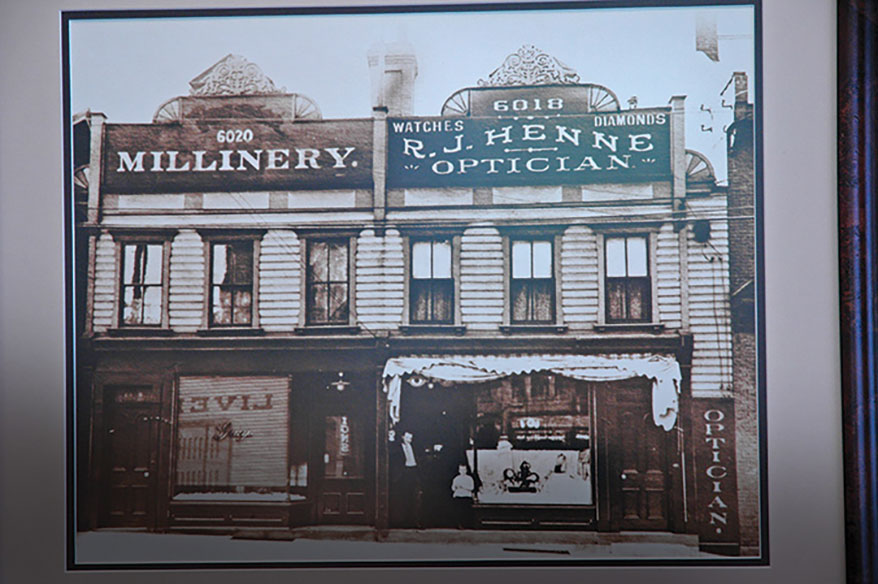
Henne: Once more an optician than jeweler
Do What’s Right
Henne Jewelers, Pittsburgh, PA
 “We live by our core values and by the motto to always be honest and do what’s right even when it hurts,” says John Henne. “We have learned that we must make the client happy even if what they are asking for is unreasonable.”
“We live by our core values and by the motto to always be honest and do what’s right even when it hurts,” says John Henne. “We have learned that we must make the client happy even if what they are asking for is unreasonable.”
Core Values
- To live by the Judeo-Christian principles of loving God and neighbor
- To always provide exceptional customer service
- To always be honest and to do what is right even when it hurts
- To provide good value
- To treat all people with dignity and understanding
- To provide and seek continuing education
- To support worthwhile charitable organizations within our local community
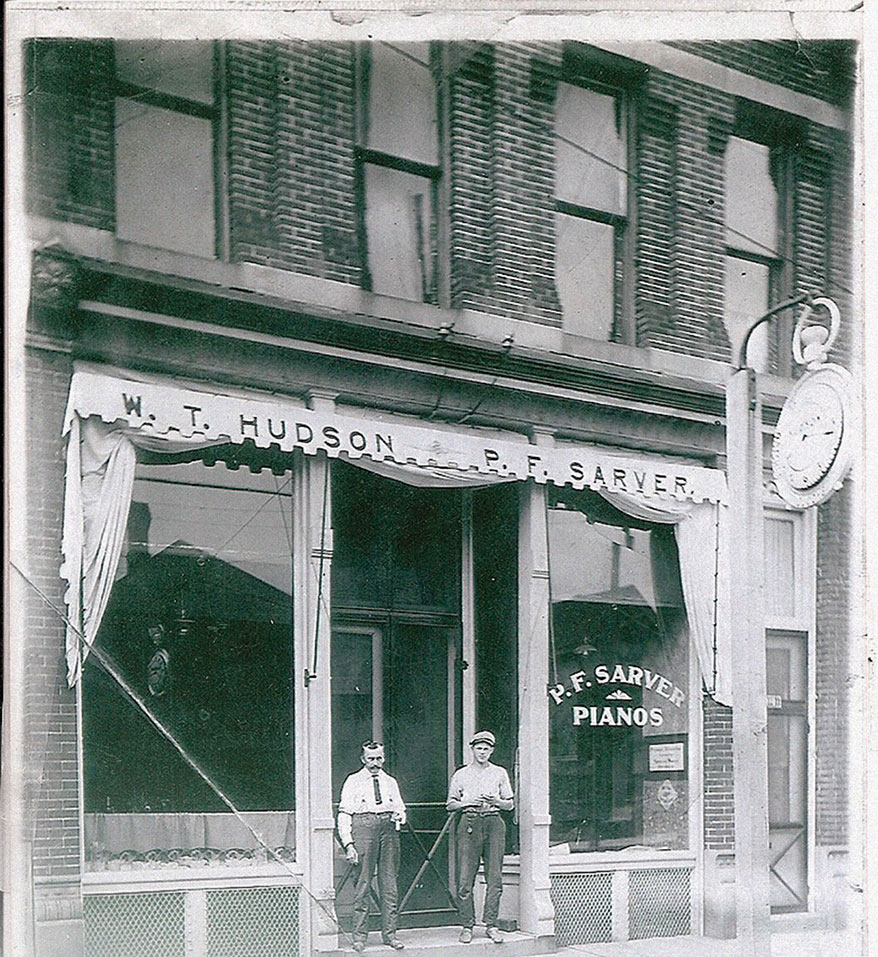
Rely on Reputation
Hudson Jewelers, St. Marys, OH
 “At one point, we had four watchmakers in town,” says Erik Mauter, who runs the store along with his wife, Nancy, and her parents, Ann and Dick Hudson. “But if you don’t evolve, you’re eventually closed down.” His business has succeeded because of its reputation, he says — crucial in a town of roughly 8,500. It’s important not to come off as stodgy, but: “You want to be known as the store you go to because your grandfather goes there and you want to be treated the same way.” It’s a lesson the Mauters are working on instilling in son Alex, 10, and daughter Madilyn, 5 — who already claims she’ll be running the store someday.
“At one point, we had four watchmakers in town,” says Erik Mauter, who runs the store along with his wife, Nancy, and her parents, Ann and Dick Hudson. “But if you don’t evolve, you’re eventually closed down.” His business has succeeded because of its reputation, he says — crucial in a town of roughly 8,500. It’s important not to come off as stodgy, but: “You want to be known as the store you go to because your grandfather goes there and you want to be treated the same way.” It’s a lesson the Mauters are working on instilling in son Alex, 10, and daughter Madilyn, 5 — who already claims she’ll be running the store someday.
Sell What People Want
BC Clark Jewelers, Oklahoma City, OK
 Benton Clyde Clark opened a watchmaker’s bench in a corner of a five and dime in Purcell, Indian Territory, 15 years before Oklahoma became a state. In 1913, during an economic panic, Clark, who had since landed a better location, began selling phonographs, player pianos, refrigerators, radios and even cars, all in addition to his core business of jewelry. Coleman Clark has followed in his great-grandfather’s footsteps in that he tries to sell what people want to buy, including custom-made William Henry pocketknives and giftware, in addition to fine jewelry and watches.
Benton Clyde Clark opened a watchmaker’s bench in a corner of a five and dime in Purcell, Indian Territory, 15 years before Oklahoma became a state. In 1913, during an economic panic, Clark, who had since landed a better location, began selling phonographs, player pianos, refrigerators, radios and even cars, all in addition to his core business of jewelry. Coleman Clark has followed in his great-grandfather’s footsteps in that he tries to sell what people want to buy, including custom-made William Henry pocketknives and giftware, in addition to fine jewelry and watches.
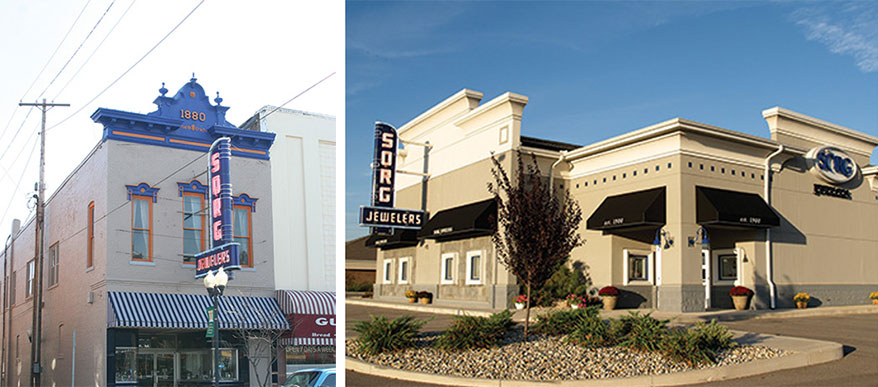
(Right) Sorg’s Elkhart, IN, location opened with a similar neon sign to the one that has hung in front of the Goshen store since the 1930s. (Left)
Keep It Fresh
Sorg Jewelers, Elkhart and Goshen, IN
 People still comment on the 16-foot neon signs that have adorned Sorg Jewelers’ locations since the early 1930s. But the family has been careful not to live in the past, notes VP Darin Sorg, offering amenities like a Starbucks machine and flat-screen monitors. A veteran of sports apparel branding, Sorg has used his expertise to keep the business’s marketing fresh too, running clever ads in unusual venues like the local paper’s spring home-improvement supplement.
People still comment on the 16-foot neon signs that have adorned Sorg Jewelers’ locations since the early 1930s. But the family has been careful not to live in the past, notes VP Darin Sorg, offering amenities like a Starbucks machine and flat-screen monitors. A veteran of sports apparel branding, Sorg has used his expertise to keep the business’s marketing fresh too, running clever ads in unusual venues like the local paper’s spring home-improvement supplement.
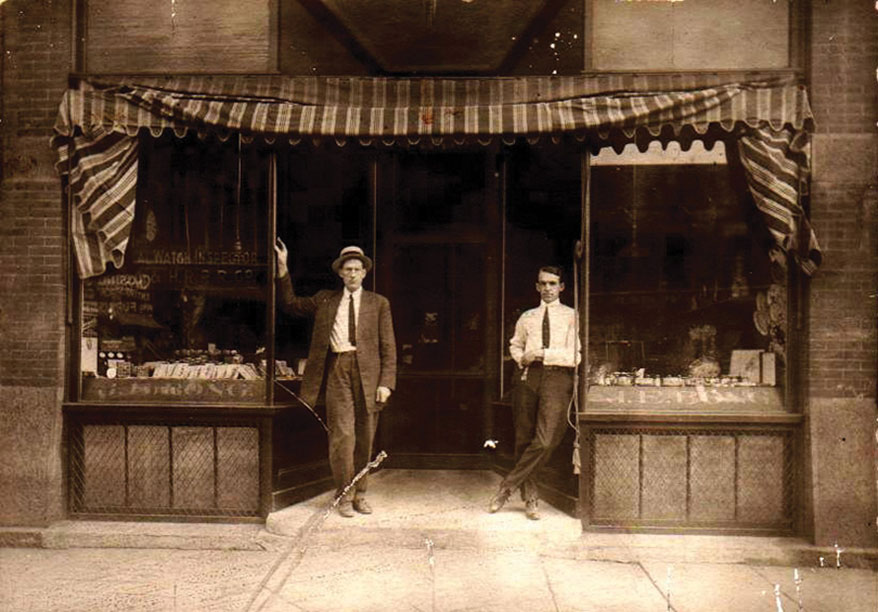
Bong’s in the early 1900s.
Promote Quality
Bong’s Jewelers, Corning, NY
 “Even during the bad times, we’ve tried to keep our quality up,” says Jeff Bong. “Sometimes we’ve had to lower our price points. But if somebody’s going to spend $500, we want them to get the best item they can for $500.” He notes that his town is a bit unusual, in that much of his client base is made up of executives at Corning Inc. “They’re just people, but we can’t be anonymous here. It’s a small community. And once you’ve lost the image of quality, it’s almost impossible to get it back.”
“Even during the bad times, we’ve tried to keep our quality up,” says Jeff Bong. “Sometimes we’ve had to lower our price points. But if somebody’s going to spend $500, we want them to get the best item they can for $500.” He notes that his town is a bit unusual, in that much of his client base is made up of executives at Corning Inc. “They’re just people, but we can’t be anonymous here. It’s a small community. And once you’ve lost the image of quality, it’s almost impossible to get it back.”
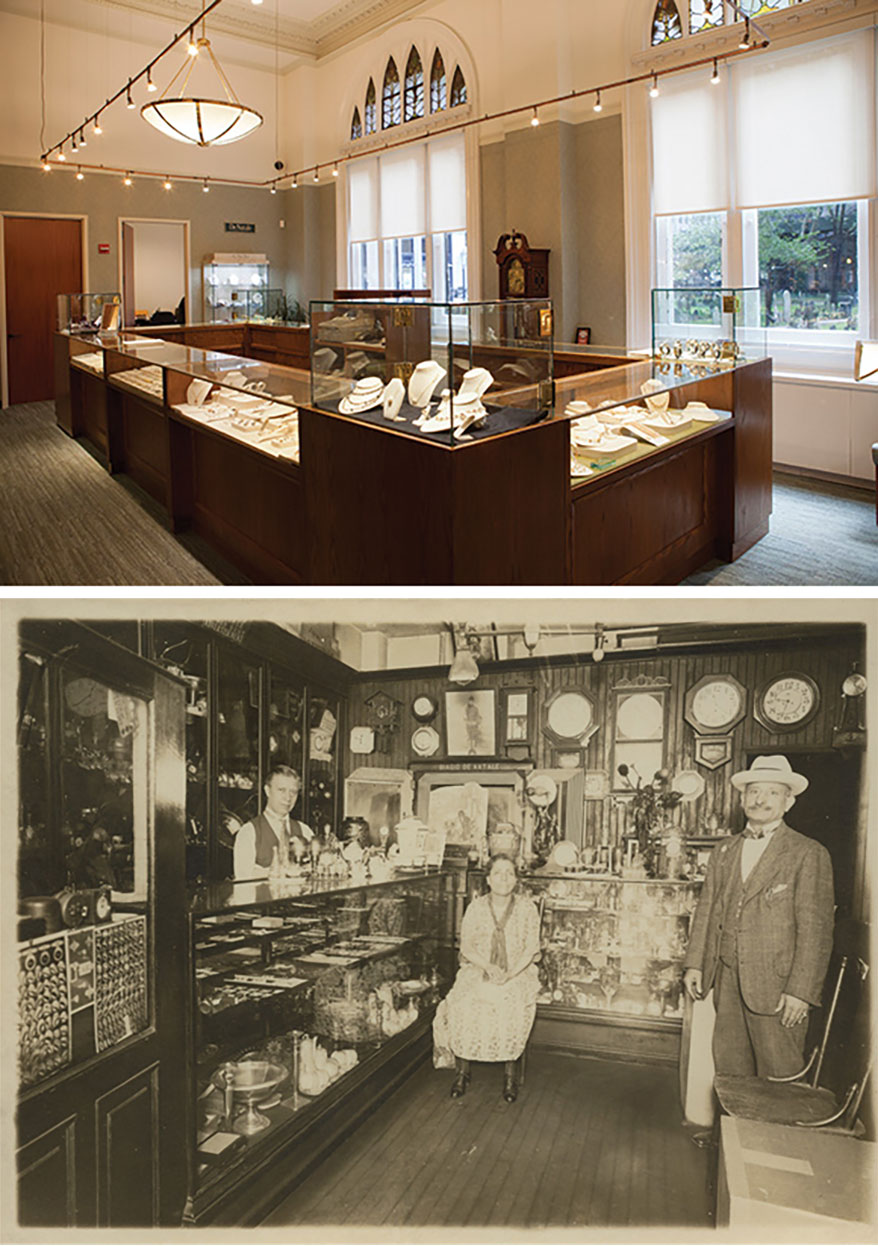
Top, DeNatale Jewelers’ newest digs nod to the past with gothic windows and antique-inspired chandeliers. Above, DeNatale’s original store.
Create Heirlooms
DeNatale Jewelers, New York, NY
 “Throughout our 105 years in New York City’s Financial District, we have created a value — to treat every customer as family,” says Robert DeNatale. “Being a fourth-generation family-run business, we work hard to ensure everyone who steps through our door knows that we have their best interests at heart. We work with them to find the perfect jewelry with the hope it will become a family heirloom and be passed down through future generations. We ensure that every treasured piece of jewelry that a person walks away with is of the best quality they can possibly have and will last a lifetime.”
“Throughout our 105 years in New York City’s Financial District, we have created a value — to treat every customer as family,” says Robert DeNatale. “Being a fourth-generation family-run business, we work hard to ensure everyone who steps through our door knows that we have their best interests at heart. We work with them to find the perfect jewelry with the hope it will become a family heirloom and be passed down through future generations. We ensure that every treasured piece of jewelry that a person walks away with is of the best quality they can possibly have and will last a lifetime.”
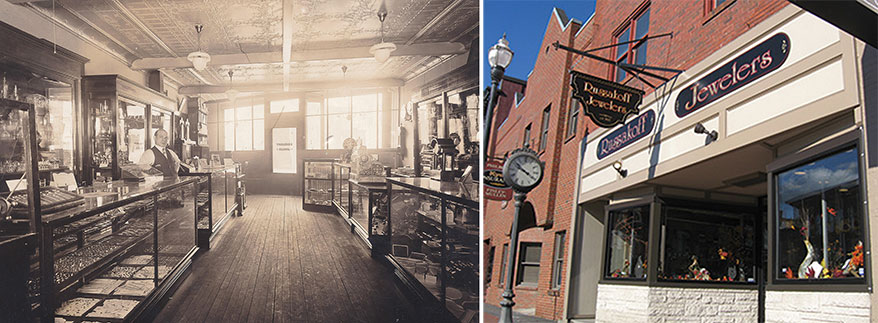
Left, Russakoff Jewelers in 1910 and its exterior today (Right)
Stand Behind Every Sale
Russakoff Jewelers, Skowhegan, ME
 “I think it’s pretty simple,” says Andy Russakoff. “If you abandon your principles and only go after a price point, you’re dumbing yourself down. One of my favorite sayings is that we wouldn’t sell something we wouldn’t be proud to wear ourselves.” The third-generation owner believes that as the industry has changed, the biggest difference between his store and the faceless big boxes is that he, as a real-life person, is standing behind every sale. “Does it mean we might have to eat something we shouldn’t once in a while? Maybe. But when your name is on the door, you have to do better.”
“I think it’s pretty simple,” says Andy Russakoff. “If you abandon your principles and only go after a price point, you’re dumbing yourself down. One of my favorite sayings is that we wouldn’t sell something we wouldn’t be proud to wear ourselves.” The third-generation owner believes that as the industry has changed, the biggest difference between his store and the faceless big boxes is that he, as a real-life person, is standing behind every sale. “Does it mean we might have to eat something we shouldn’t once in a while? Maybe. But when your name is on the door, you have to do better.”
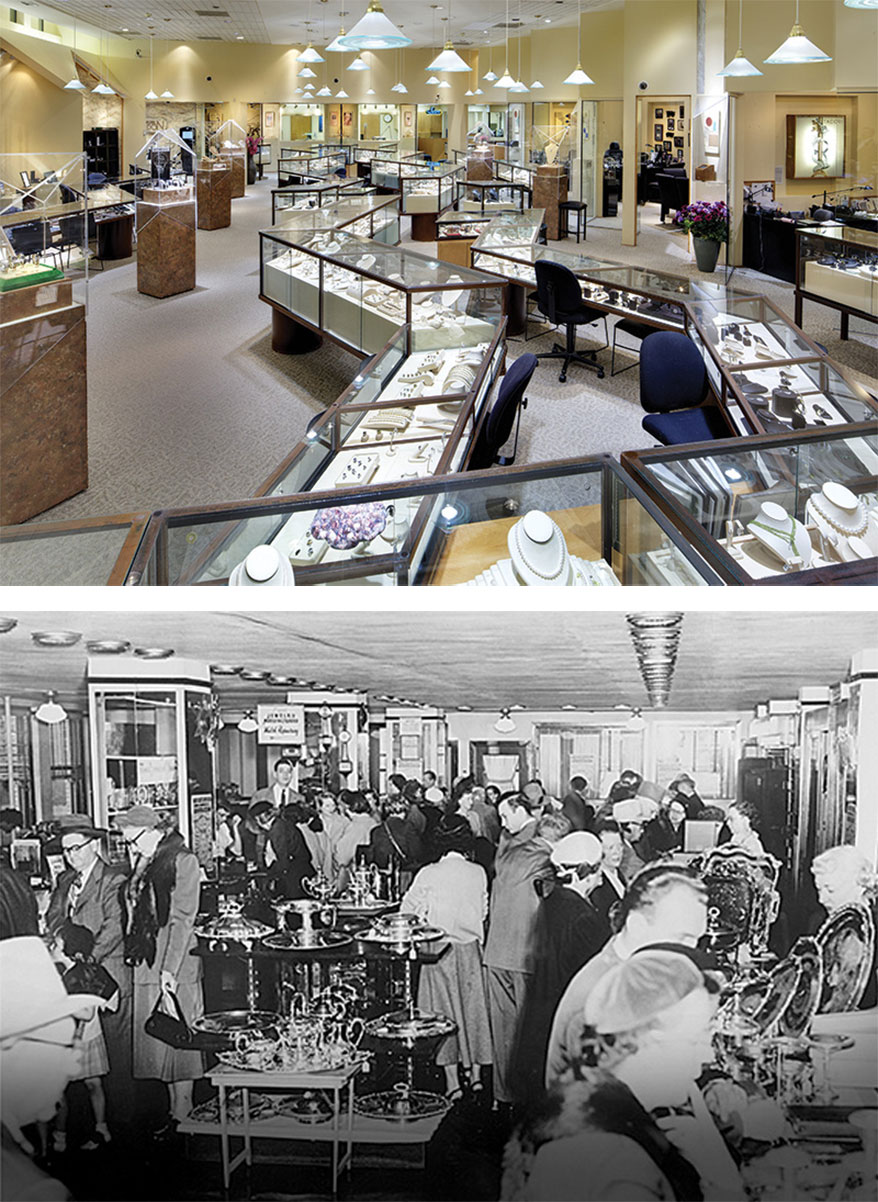
Top, Keeping up with the times: Samuel Gordon Jewelers; Drawing crowds since 1904: Samuel Gordon Jewelers (Bottom)
Set Clear Goals
Samuel Gordon Jewelers, Oklahoma City, OK
 “Our firm was founded by Samuel Gordon, and has been in continuous operation, under the leadership of Samuel Gordon, then his son Norman, then his son Gary, then his son Daniel, for the past 109 years,” Gary Gordon says. “We’ve learned that the continuation of our business has depended on achieving the following goals: 1. To take care of our customers (service, quality of merchandise, fair prices, useful knowledge). 2. To take care of our vendors (paying properly, being loyal). 3. To take care of our employees (paying fairly, providing training, treating them with respect). 4. To take care of our bottom line: we deserve to make a reasonable profit. 5. And last, but not least, to take care of ourselves.”
“Our firm was founded by Samuel Gordon, and has been in continuous operation, under the leadership of Samuel Gordon, then his son Norman, then his son Gary, then his son Daniel, for the past 109 years,” Gary Gordon says. “We’ve learned that the continuation of our business has depended on achieving the following goals: 1. To take care of our customers (service, quality of merchandise, fair prices, useful knowledge). 2. To take care of our vendors (paying properly, being loyal). 3. To take care of our employees (paying fairly, providing training, treating them with respect). 4. To take care of our bottom line: we deserve to make a reasonable profit. 5. And last, but not least, to take care of ourselves.”
Advertisement
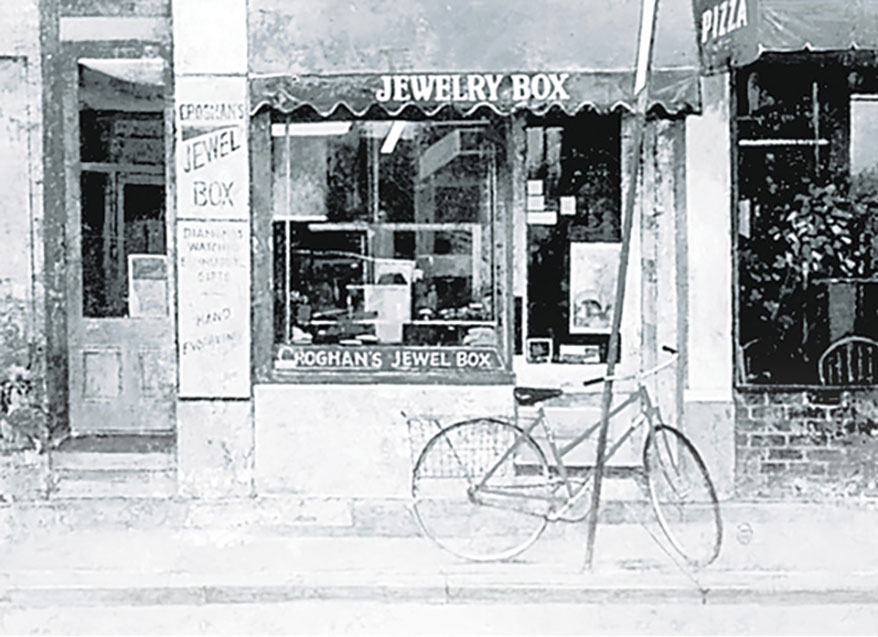
Always in the same place: Croghan’s Jewel Box
Stick Around
Croghan’s Jewel Box, Charleston, SC
 Ownership of this store was passed down through daughters, first from William Croghan to Mary Ramsay, and then to Ramsay’s daughters Mariana Hay and Rhett Outten. “The names keep changing, but the place remains the same,” Hay jokes. She attributes the store’s longevity in part to her mother’s foresight in buying their building in the ’70s, “before the big brands came in to jack up the rents.” Tourism helps too: Condé Nast Traveler’s readers recently voted Charleston the No. 1 tourist destination in the world.
Ownership of this store was passed down through daughters, first from William Croghan to Mary Ramsay, and then to Ramsay’s daughters Mariana Hay and Rhett Outten. “The names keep changing, but the place remains the same,” Hay jokes. She attributes the store’s longevity in part to her mother’s foresight in buying their building in the ’70s, “before the big brands came in to jack up the rents.” Tourism helps too: Condé Nast Traveler’s readers recently voted Charleston the No. 1 tourist destination in the world.

A mid-century Christmas crowd at Hamilton Jewelers
Never Say No
Hamilton Jewelers, NJ and FL
 “Our inspiration for our future is drawn from the details of our past,” says Hank Siegel, current president. Founder Irving Siegel became frustrated if he had to turn a customer away for any reason. So he instructed his associates to “never say no” to a client request. Occasionally, if Hamilton were to sell out of a popular item, such as a sterling dresser set or baby rattle, Irving would go to another store, purchase a similar item, and deliver it to his client, rather than have the client leave disappointed. Hank Siegel also took to heart his grandfather’s advice not to over-expand the business. “He reminded me time and again that we can be more profitable and maintain growth by continuing to invest in our existing markets, rather than spread ourselves too thin.” (See how Hamilton celebrated its 100th anniversary in this month’s “Best of the Best” on page 98.)
“Our inspiration for our future is drawn from the details of our past,” says Hank Siegel, current president. Founder Irving Siegel became frustrated if he had to turn a customer away for any reason. So he instructed his associates to “never say no” to a client request. Occasionally, if Hamilton were to sell out of a popular item, such as a sterling dresser set or baby rattle, Irving would go to another store, purchase a similar item, and deliver it to his client, rather than have the client leave disappointed. Hank Siegel also took to heart his grandfather’s advice not to over-expand the business. “He reminded me time and again that we can be more profitable and maintain growth by continuing to invest in our existing markets, rather than spread ourselves too thin.” (See how Hamilton celebrated its 100th anniversary in this month’s “Best of the Best” on page 98.)
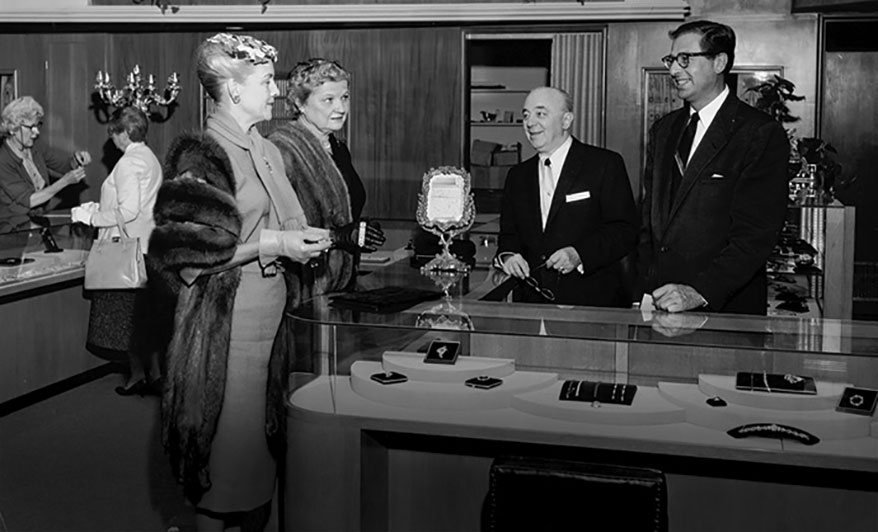
Tivol in the 1950s
Focus on the Community
Tivol, Kansas City, MO
 “We have survived and thrived in Kansas City for 103 years by providing unparalleled customer service, access to the world’s finest jewelry and timepieces and especially by maintaining a close relationship with our customers and the community,” says marketing coordinator Kelly Schottler. One example: In 2010, for Tivol’s 100th anniversary, the business implemented 100 Acts of Kindness, a dedication to performing 100 acts to benefit primarily local charities. Donations were made, volunteer hours were logged, and every store event benefited a charity.
“We have survived and thrived in Kansas City for 103 years by providing unparalleled customer service, access to the world’s finest jewelry and timepieces and especially by maintaining a close relationship with our customers and the community,” says marketing coordinator Kelly Schottler. One example: In 2010, for Tivol’s 100th anniversary, the business implemented 100 Acts of Kindness, a dedication to performing 100 acts to benefit primarily local charities. Donations were made, volunteer hours were logged, and every store event benefited a charity.
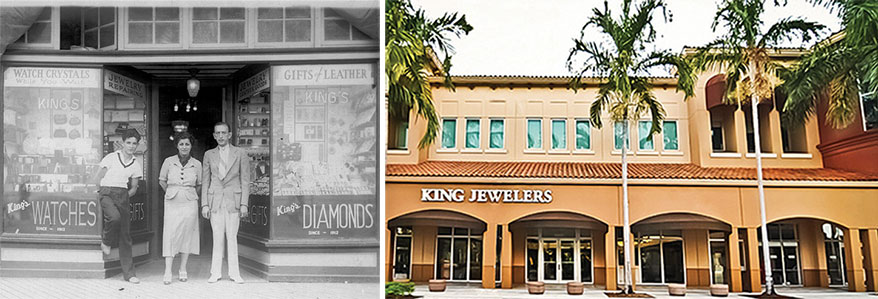
From a small-town storefront to A-list clientele: King Jewelers
Exceed Expectations
King Jewelers, Aventura, FL, and Nashville, TN
 The Kings attribute their business longevity to their efforts to provide quality, value and integrity to every client, says Jono King, great-grandson of founder Louis King. Frank Sinatra, Babe Ruth, Elton John, Taylor Swift, Faith Hill and Reba McEntire have all been King clients. But the Kings’ most cherished memories come from all of the engagements they’ve helped facilitate. Maxine King has been known to propel many a nervous groom-to-be straight out the door and into the arms of his beloved, with a suitable ring, of course, and the tough-love pep talk, “Just go do it.” The event-planning staff even arranges romantic beach settings, helicopter rides, sporting-event proposals and dinners on yachts.
The Kings attribute their business longevity to their efforts to provide quality, value and integrity to every client, says Jono King, great-grandson of founder Louis King. Frank Sinatra, Babe Ruth, Elton John, Taylor Swift, Faith Hill and Reba McEntire have all been King clients. But the Kings’ most cherished memories come from all of the engagements they’ve helped facilitate. Maxine King has been known to propel many a nervous groom-to-be straight out the door and into the arms of his beloved, with a suitable ring, of course, and the tough-love pep talk, “Just go do it.” The event-planning staff even arranges romantic beach settings, helicopter rides, sporting-event proposals and dinners on yachts.